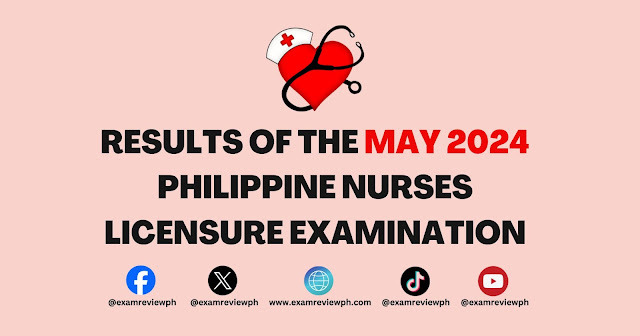The Professional Regulation Commission (PRC) has announced the results of the May 2024 Philippine Nurses Licensure Examination. A total of 7,749 out of 11,116 examinees successfully passed the rigorous exam administered by the Board of Nursing across multiple testing centers, including locations in the National Capital Region (N.C.R.), Baguio, Butuan, Cagayan de Oro, Cebu, Davao, Iloilo, Koronadal, Legazpi, Lucena, Pagadian, Pampanga, Rosales, Tacloban, Tuguegarao, Zamboanga, and Puerto Princesa, Palawan.
The Board of Nursing, which oversees the licensure examination, is composed of a dedicated team of professionals. The board is chaired by Hon. Elsie A. Tee, with members Hon. Carmelita C. Divinagracia, Hon. Elizabeth C. Lagrito, Hon. Zenaida C. Gagno, Hon. Marylou B. Ong, Hon. Merle L. Salvani, and Hon. Leah Primitiva S. Paquiz, who is currently on leave.
Registration Process
Starting June 19, 2024, successful examinees can begin the registration process for their Professional Identification Card (ID) and Certificate of Registration. The PRC has streamlined this process to be conducted online. Examinees are instructed to visit the PRC's official website at www.prc.gov.ph and follow the detailed instructions for initial registration.
Required Documents
To complete the registration, the following documents are required:
- Downloaded and duly accomplished Oath Form or Panunumpa ng Propesyonal
- Notice of admission (for identification purposes only)
- Two pieces of passport-sized pictures (colored with white background and complete name tag)
- Two sets of documentary stamps
- One piece of short brown envelope
It is essential for all successful examinees to personally register and sign in the Roster of Registered Professionals to ensure their official inclusion in the professional registry.
The PRC's announcement marks a significant milestone for the successful examinees who are now on their way to becoming registered nurses in the Philippines. This achievement not only reflects their dedication and hard work but also signifies their readiness to contribute to the healthcare sector.
PERFORMANCE OF SCHOOLS
The performance of schools in the May 2024 Philippine Nurses Licensure Examination in alphabetical order as per R.A. 8981 otherwise known as PRC Modernization Act of 2000 Section 7(m) "To monitor the performance of schools in licensure examinations and publish the results thereof in a newspaper of national circulation" is as follows:
Any discrepancy in the report is not intentional on the part of the Commission, but rather due to miscoding of school codes by the examinees themselves. Concerned schools may write the Commission for correction.
PRC Philippines
The academic content of nursing education in the Philippines covers a comprehensive range of subjects and topics to equip aspiring nurses with the knowledge, skills, and competencies necessary for their professional practice. Here's an overview of the academic content typically included in Philippine nursing programs:
1. Basic Sciences: Nursing education usually begins with foundational courses in basic sciences, including anatomy, physiology, microbiology, and biochemistry. These courses provide students with a solid understanding of the human body's structure and function, as well as the principles of disease processes.
2. Behavioral Sciences: Courses in psychology and sociology are integrated into nursing curricula to help students understand human behavior, social determinants of health, and the psychosocial aspects of patient care. This knowledge is essential for effective communication, therapeutic relationships, and holistic patient care.
3. Nursing Theory and Practice: Nursing theory courses introduce students to the conceptual frameworks, models, and theories that guide nursing practice. They learn about the nursing process, including assessment, diagnosis, planning, implementation, and evaluation of patient care. Clinical practice experiences allow students to apply theoretical knowledge in real-world healthcare settings under the supervision of experienced nurses and clinical instructors.
4. Medical-Surgical Nursing: Medical-surgical nursing courses cover the care of adult patients with various medical and surgical conditions. Topics include pharmacology, pathophysiology, perioperative care, wound management, and the management of acute and chronic illnesses across the lifespan.
5. Maternal and Child Health Nursing: This area of nursing education focuses on the care of women during pregnancy, childbirth, and the postpartum period, as well as the health of newborns, infants, children, and adolescents. Topics may include prenatal care, labor and delivery, newborn care, pediatric growth and development, and pediatric diseases and disorders.
6. Mental Health and Psychiatric Nursing: Courses in mental health and psychiatric nursing address the assessment, diagnosis, and management of mental health disorders and psychosocial problems. Students learn therapeutic communication techniques, crisis intervention strategies, and mental health promotion and prevention strategies.
7. Community Health Nursing: Community health nursing emphasizes the promotion of health and prevention of illness within communities. Students learn about epidemiology, community assessment, health education, disease prevention, and healthcare delivery in diverse community settings. Community immersion experiences allow students to work with community members and healthcare providers to address local health needs.
8. Nursing Ethics and Legal Issues: Courses in nursing ethics and legal issues explore ethical principles, professional standards of practice, legal regulations, and ethical dilemmas commonly encountered in nursing practice. Students learn about patient rights, confidentiality, informed consent, and ethical decision-making processes.
9. Research and Evidence-Based Practice: Nursing research courses introduce students to research methods, evidence-based practice principles, and the critical appraisal of research literature. They learn how to use research findings to inform clinical practice, improve patient outcomes, and contribute to the advancement of nursing knowledge.
10. Leadership and Management: Nursing leadership and management courses prepare students for leadership roles in healthcare settings. Topics may include healthcare systems and policies, organizational behavior, human resource management, quality improvement, and interdisciplinary collaboration.
In addition to these core academic subjects, nursing programs in the Philippines may offer elective courses or concentrations in specialized areas of nursing practice, such as critical care nursing, oncology nursing, gerontological nursing, or palliative care. Clinical rotations and practicum experiences are integral components of nursing education, providing students with hands-on learning opportunities in various healthcare settings, including hospitals, clinics, community health centers, and long-term care facilities.

